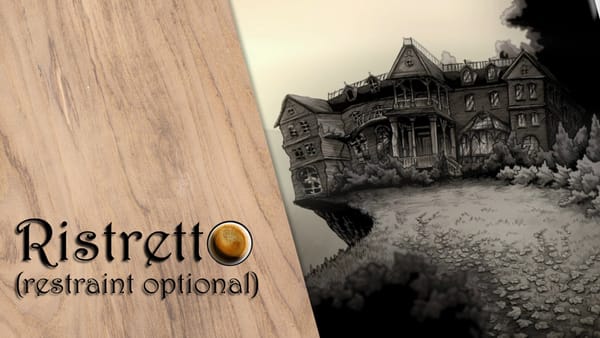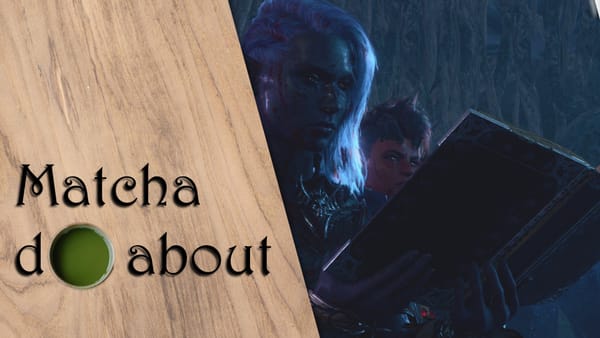Pepper Grinder: Dirt Dolphin Dopamine
Pepper Grinder is an excellent 2d-action platformer with responsive controls, a fun art style and wonderfully creative level design, that is held back by mediocre bosses and rewards.
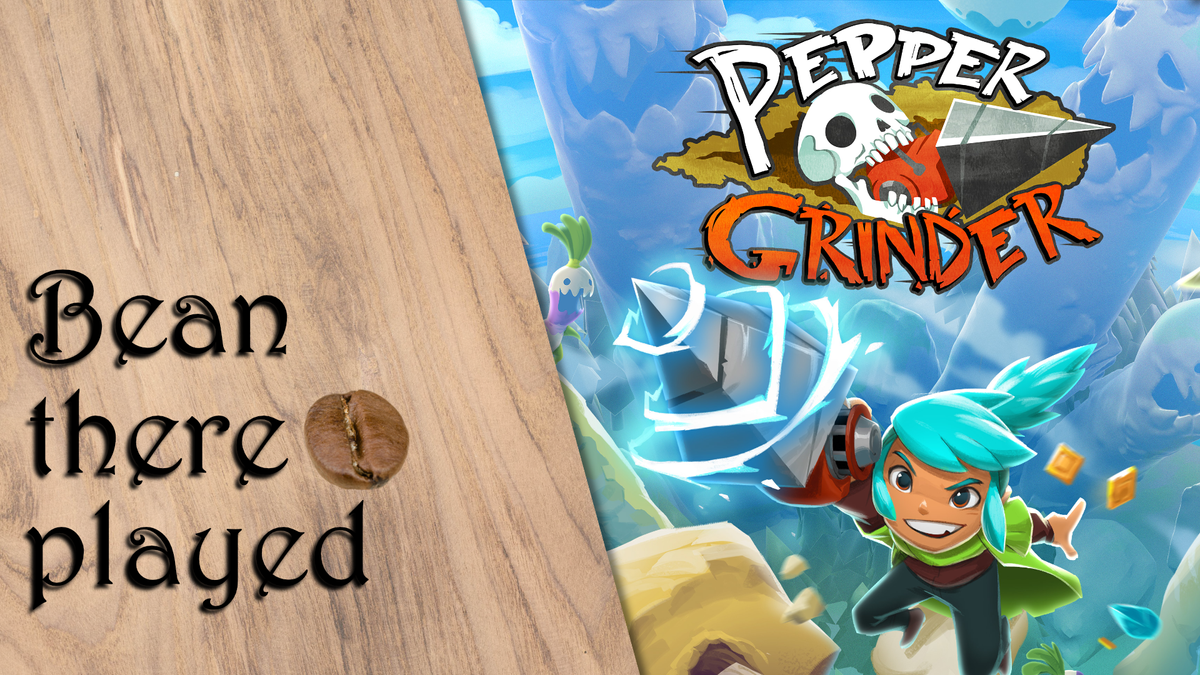
Because the game is so short, and much of its fun lies in seeing the game unfold, this review will be limited to the first "world" of the game.
Quick Facts
Developer: Ahr Ech
Publisher: Devolver Digital
Platform: PC, Switch
Genre: 2D Platformer
Completion Time: ~4-9 hours
Price: $14.99
Pepper Grinder starts very quickly: The titular Pepper shipwrecks on a coast, some monsters steal her stuff, she wants to get it back, follows them across a bridge, a bad guy cuts the bridge while she's on it, and Pepper falls into the first level, grabbing her trusty grinder on the way down.
Dirt Dolphin Dopamine
Right from the start, movement in Pepper Grinder feels fantastic - which is good, because movement is what this game is. Players can walk and jump just fine, despite carrying a heavy grinder. The animations for jumping are just subdued enough that they sell the weight of the grinder in Pepper's hands.
Once Pepper reaches the first mound of dirt, though? I'm digging this.
It's great fun being a dirt dolphin!
In the dirt, Pepper is a veritable dirt dolphin, jumping in and out of the dirt in great leaps. Controls are simple enough: Players move with either WASD or stick, there is a jump key, and a dig key. That's it, nice and simple.
This doesn't mean there is no depth to this game, though! There are several techniques that can be executed, like this very satisfying water skip:
Skipping on water like a rock... rocks!
These techniques are never explicitly taught or even mentioned to players, they are simply discovered through experimentation and engagement with the game's mechanics, which I think is wonderful because it encourages players to think outside the box.
I cannot overstate how fun it feels to control Pepper in these environments. The controls manage to maintain a nice balance between being responsive enough, and having enough inertia that the game sells me on the idea that my character is indeed attached to a turbo-grinder dragging me through mud. Bravo!
A very welcome inclusion in all of this is the speed slider: Should the game be too fast, players can turn it down in increments, even to half-speed, should they so desire. This should be great for anyone who wants to enjoy the game, still wants to display technical skill, but does not have the reflexes (or the inclination) to play at full speed. I would love to see this feature included in more games like this.
A Video-Game-Ass Video Game
Pepper Grinder is unapologetically an arcade video game. Players are here to have fun, the game is here to provide the fun, and it does so masterfully. There is not an ounce of fat in its design, but the creativity that has gone into each and every level makes all of them a joy to traverse.
Almost every level introduces a new mechanic - sometimes these mechanics reoccur, sometimes they are specific to a level or a world.
Among the first mechanics players encounter are cannons! Players can enter these and they will shoot Pepper across the map. How long players hold the "dig" button adjusts the angle of the cannon, and depending on the level, this can very much alter the destination.
With cannon, you can
Another mechanic introduced early on are hinges. These will be positioned in a certain way until the player hits them by digging into them, at which point they will flip. These come in different colors, and hitting a blue switch will flip all blue switches nearby, providing players with the challenge of finding the correct sequence.
In total, players will be digging through 4 worlds that contain 4-5 levels each, including a boss level at the end of every world. The worlds are distinct from one another, and players progress through them linearly.
Each level is outstandingly well-crafted and features some new twist to surprise and engage the player, which is why I'm sad to see that the game only lasts a few hours. The things Pepper Grinder does well provide such a genuinely fun time, that I don't want to be done.
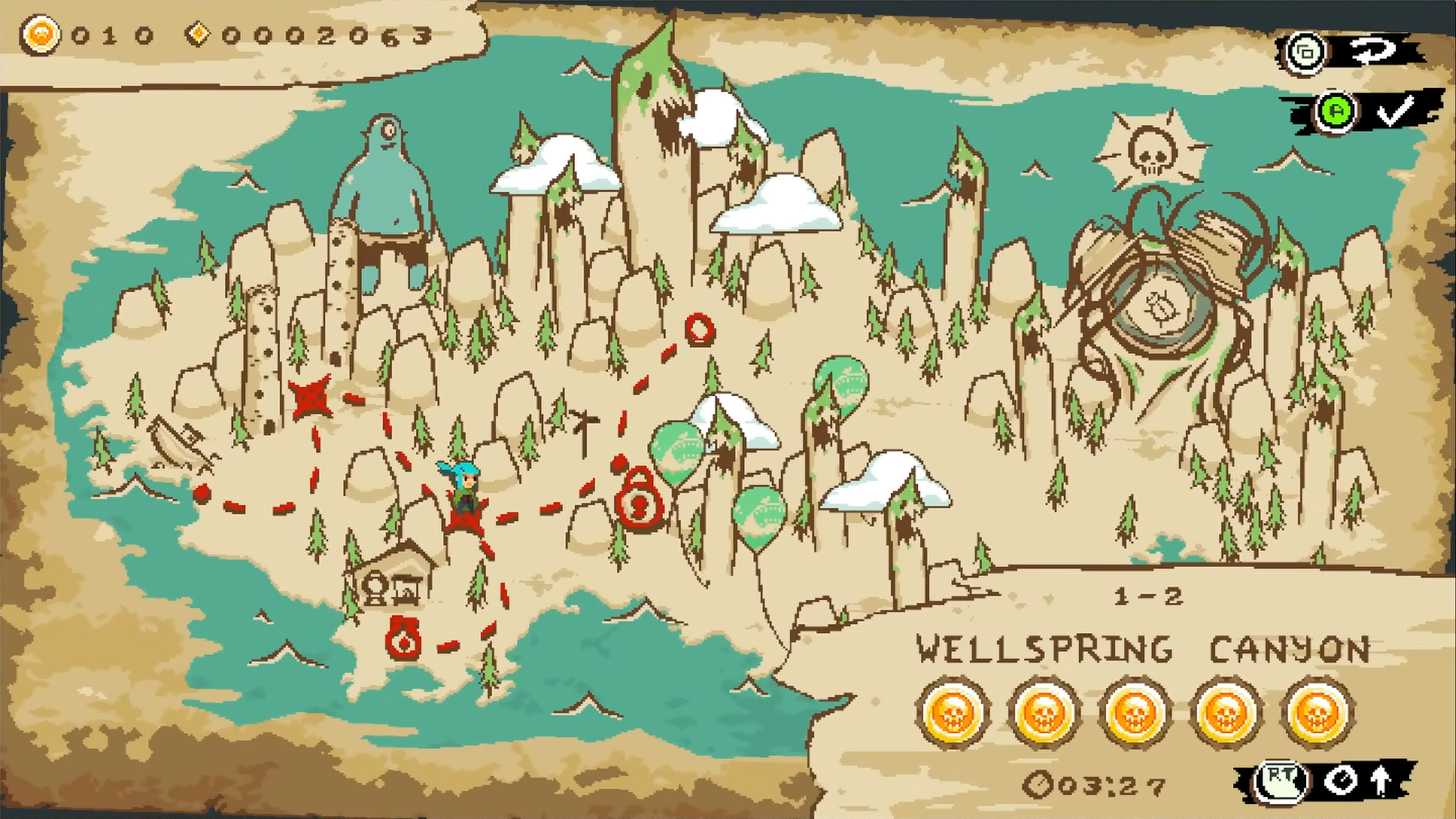
Each level features two modes of play: The default Exploration mode and Time Attack Mode. Neither changes anything about the levels, but Exploration mode focuses on learning the level and uncovering its secrets:
Each level comes with 5 coins that are hidden somewhere in the level, usually slightly off the critical path. These provide a further incentive for exploration and learning the level, which can then be leveraged in Time Attack Mode.
The Need for Speed(running)
Pepper Grinder's design lends itself very well to speedrunning. In its time Attack Mode, the name is the game: Players are competing for time, essentially from bronze to gold. Completing these will earn players bragging rights and stickers, about which I will talk later.
Sadly, the game lacks an online leaderboard for time attack, so there is currently no way of knowing just how much better than their friends players are - which is what this is all about, isn't it?
Pepper Grinder's levels are essentially environmental puzzles, yes, but they are high-speed puzzles, and once players memorise a route and know what's coming, the game allows them to enter a cathartic flow state that feels fantastic.
All of this is to say that the level design is there, but the lack of an online leaderboard might seriously hurt the appeal of competition for the community.
Middling Bosses
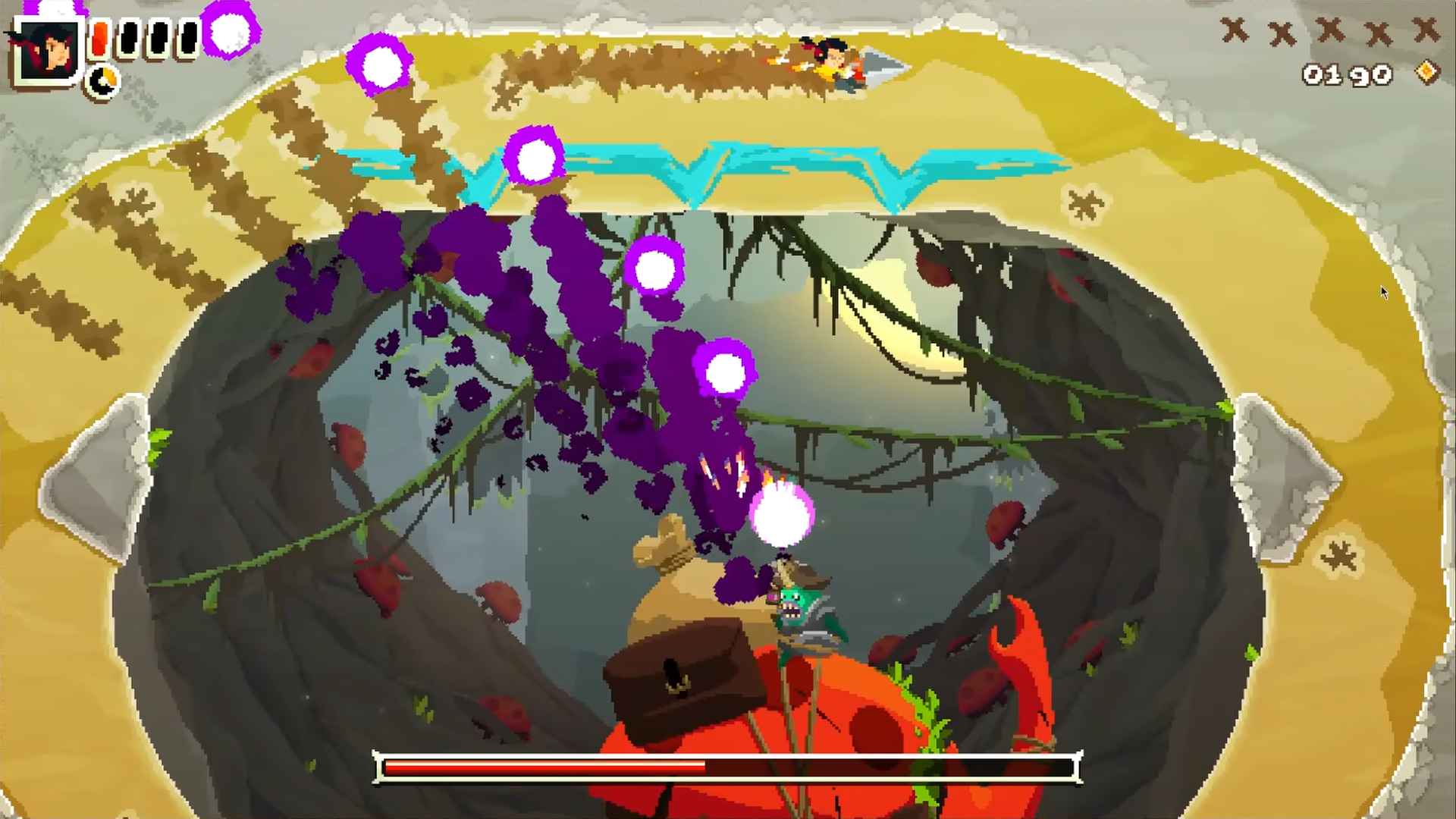
While I often really enjoy boss fights in video games, the bosses of Pepper Grinder underwhelmed me. They are perfectly adequate fights given the limited set of mechanics at play, but ultimately, they all play the same way: Avoid the boss' attacks while waiting for a chance to drill into them, repeat until they fall over.
The movesets these bosses use aren't overly complex and usually limited to one or two mechanics that players need to manage. That doesn't mean they are necessarily too easy, but the creativity of the levels preceding these bosses often outshines the bosses themselves.
Lackluster Rewards
Pepper Grinder has one currency, coins, and two rewards: Skullcoins and Stickers.
Coins are scattered across the path in levels and are also given out as completion rewards. These can be farmed and are handed out generously.
Skullcoins are limited and can be found hidden in the levels. They can then be taken to shops around the world to buy rewards with them. There are exactly enough Skullcoins in the game to buy all the items from all the shops.
The shops provide four types of rewards:
- Sticker Album Pages
These are bought with Skullcoins and are pages for an in-game sticker book. Players can open these pages to place stickers on them. If they want to complete their sticker collections, they will also need to earn the stickers awarded for completion of the Time Attack mode. - Sticker-Gacha
Each Shop provides a Sticker-gacha machine, where, in exchange for in-game coins, players receive a random sticker from a pool. Players can then put these stickers onto the Sticker Album Pages. - Temporary Health
Each Shop also features a "Health Gacha" that provides players with temporary, non-refillable bonus health. Don't worry, there is no actual gacha element here, players will receive the health they pay for. - Keys
Shops also sell keys to unlock a bonus level on each map. These levels are optional and usually strongly feature a particular gimmick. Keys are sold for Skullcoins. - Outfits
These include body- and hairdyes for Pepper and are bought with Skullcoins.
Overall, these rewards work, but apart from the keys, outfits and hairdyes, they hold little value to me, as I don't enjoy gathering stickers for a virtual sticker book. If I received some stickers randomly at the end of a level, I might passively fill it, but the fact that I have to manually go to a shop, and then hold a button to receive one random sticker every few seconds makes this really unappealing and tedious to me. I'd really preferred it if the game had no reward structure at all, but included another world to explore, instead.
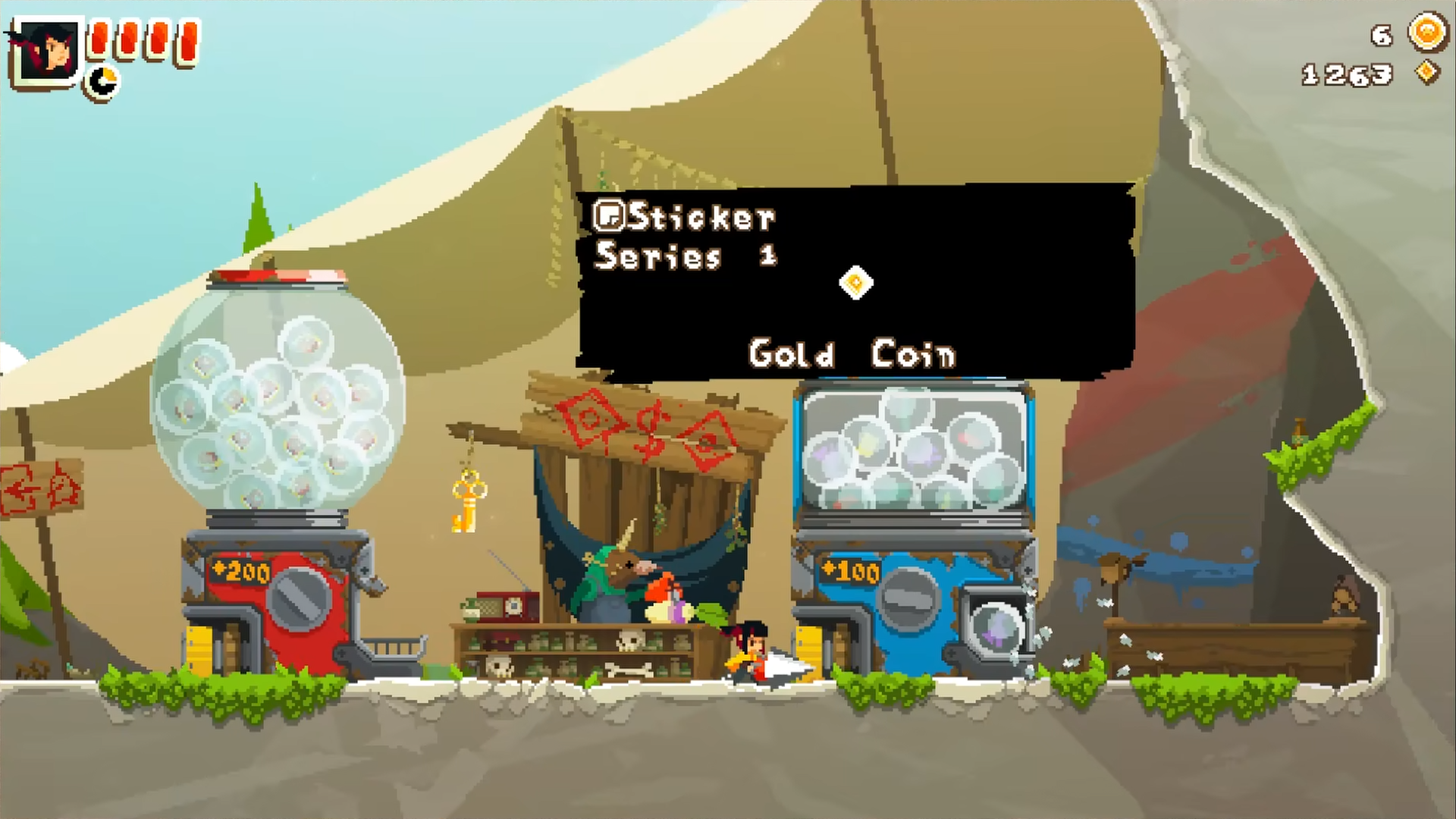
While I am on unappealing, the UI could use some work with its button prompts. When navigating menus and the sticker book, not all button labels are immediately clear in what they represent, or what pressing the button will actually do. It's nothing that pressing the button and finding out can't fix, but I'd rather not have to guess in the first place.
The Dopamine Wins Out
Ultimately, while the game does have some minor shortcomings, the overall experience of playing Pepper Grinder is simply so fun that I have to recommend it.
For players who don't mind a shorter game that is completely focused on providing a fun ride through its gameplay, then Pepper Grinder is a game for you.


